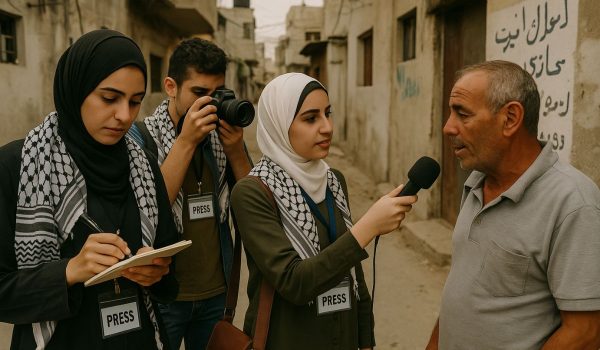In classrooms, libraries, and community centers across Palestine, a new wave of storytellers is emerging. These aren’t seasoned reporters or career journalists. They’re students—young writers, photographers, and editors—who are finding their voices and using them to uplift the stories around them.
Student journalism is more than just practice for future careers. It’s a platform where young people engage deeply with their communities. Through local interviews, photo essays, and reports on daily life, these students are creating powerful narratives that reflect real experiences, real challenges, and real hope.
Why Local Journalism from Students Matters
Student journalism gives young people the chance to speak up, ask hard questions, and reflect the world they know. This article looks at how student-led reporting is shaping public dialogue in Palestine and beyond.
We’ll highlight student publications, the kinds of stories they tell, how they’re supported, and why their contributions matter for both community awareness and civic engagement.
Telling Stories No One Else Is Telling
Large news organizations often focus on big headlines, but student journalists tend to focus on what’s happening right next door. They write about water shortages in their town, youth projects, overlooked heritage sites, and personal profiles of local workers or educators.
These stories may not grab international attention, but they carry deep meaning for the people who live them. When a high school student covers the reopening of a neighborhood library or shares the story of a woman leading a sewing co-op, they are not only practicing journalism—they’re strengthening community memory.
Students also write from a position of deep connection. They often know the people and issues firsthand. Their storytelling reflects a kind of closeness and sincerity that professional reporters sometimes miss.
Creating Spaces for Critical Thinking
Student journalism encourages critical thinking, especially in places where public discourse can feel restricted or politicized. When students write, they’re not just learning how to report—they’re learning how to question, verify, and communicate with care.
Whether they’re covering a student protest or the state of their school’s infrastructure, young journalists begin to see how issues are layered and complex. They learn how to listen. They learn the value of different voices.
These skills build confidence. A student who once feared speaking in public may later lead a community forum or help organize a publication launch. Journalism becomes a path to empowerment.
Tools, Mentors, and Collaboration
Behind many student journalism efforts are teachers, mentors, and organizations that provide guidance and structure. Some schools include journalism as part of their extracurricular programs. Others partner with community media organizations to run training sessions on reporting, editing, and ethics.
Workshops often cover both the basics—like how to write a lead or fact-check a quote—and deeper topics like bias, privacy, and social impact. Many young journalists also learn photography, layout design, and social media storytelling, expanding their skills beyond the written word.
In refugee camps and remote towns, even access to basic tools like notebooks, voice recorders, or a shared computer lab can make a difference. With these tools, students begin documenting the world around them in their own words and images.
The Role of Language and Identity
In Palestine, student journalists often write in both Arabic and English. This bilingual storytelling opens doors. Articles written in Arabic speak directly to local audiences. Stories translated into English can reach global readers and offer a more nuanced picture of life on the ground.
This dual-language approach also reflects identity. It shows that student journalists are grounded in their culture but also eager to reach across borders. In doing so, they help bridge gaps in understanding between Palestine and the wider world.
For many students, writing in both languages also helps strengthen their voice. They learn how to translate emotion and meaning across cultures—an invaluable skill for anyone seeking to tell powerful, honest stories.
Building Confidence and Connection
When a student sees their article published—whether in a school bulletin, a community newsletter, or an online platform—it means something. It means their voice matters. It means their perspective counts.
This sense of recognition builds confidence, and that confidence carries over into other parts of life. Many student journalists go on to become educators, organizers, or professional writers. Others simply gain a stronger sense of themselves and their ability to shape conversations.
Just as important is the connection built between students and their communities. Interviewing elders, photographing local events, and covering cultural traditions brings generations together. Journalism becomes a bridge—not just of information, but of empathy.
Real Impact Through Local Reporting
Student journalism can have real impact. Articles have helped raise awareness about unsafe school conditions, encouraged cleanup projects, and inspired community events. In some cases, local leaders respond directly to stories written by students, acknowledging their concerns or thanking them for raising issues.
When students see this kind of result, they realize that their work matters. They see that journalism isn’t just about reporting facts—it’s about helping people see, feel, and care.
This sense of impact motivates young reporters to keep writing. It shows them that their words don’t have to wait. They can contribute now, even before graduating or choosing a career.
A Future Fueled by Young Voices
Student journalism isn’t just preparation for the future. It’s shaping the present. As these young writers grow more confident, more curious, and more connected, they’re already helping shape the media landscape of their communities.
At PalestineWorks.org and in other spaces of growth, these voices are being encouraged—not just to write more, but to write with meaning, with care, and with a deep love for the places they come from.
In every headline, photo caption, and shared story, student journalism reminds us that real change often starts with a question, a notebook, and a young person willing to listen.

